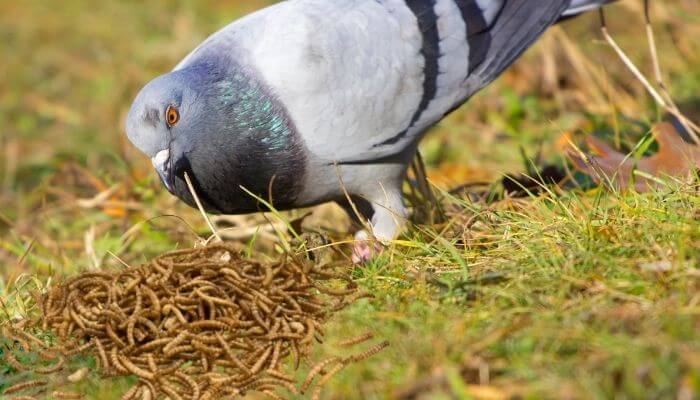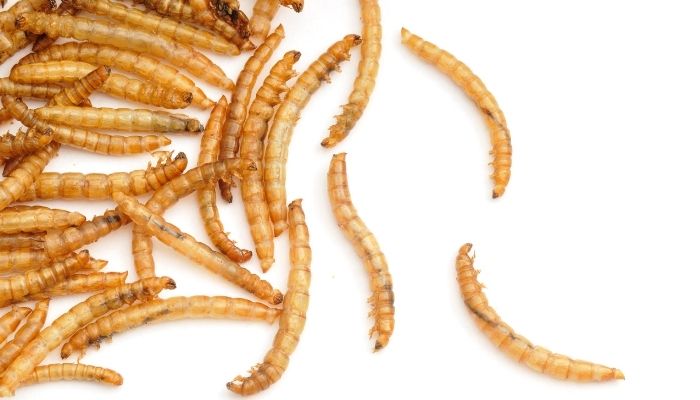Some pigeons do eat mealworms, and it seems like it is all based on the taste of the bird itself. If your birds are raised where they receive mealworms, then they will become accustomed to it.
But, if you drop a few mealworms in with your pigeons, it seems only some will eat them.
As an Amazon Associate I earn a small fee from qualifying purchases made through Amazon links. This helps us run the site – thanks for your support!
Pigeons do not naturally eat mealworms.

They would have a hard time finding the larvae of the mealworm beetle in the wild.
However, there are plenty of nutrients in mealworms would contribute greatly to the healthy diet of a pigeon.
Mealworms themselves are strange creatures.
Commercially, they are often bred in batches and are given hormones to keep them in their larval form, which is why they are then able to grow as long as 2cm in length.
They are also one of the few creatures on the planet that can live a healthy life while also eating polystyrene for around 50% of its diet!
Even after living on a diet of 50% polystyrene and 50% grain/bran/etc., mealworms are still fit for human, animal and bird consumption.
Nutritional Content of Mealworms
Mealworms breakdown into the following constituents, approximately:
- Moisture – 64%
- Protein – 18%
- Lipids (fats) – 14%
- Carbohydrates – 3%
- Ash – 1%
Some dried mealworms can be a very good source of protein for your pigeons, as the protein content can be as high as 50%.
Mealworms should not become too high a percentage of your pigeon’s regular diet because they are high in protein and fat, which means they can overly fatten your birds.

On the other hand, if your birds are looking a little thin, or spindly, or are having trouble flying, then a few meals with mealworms mixed in will be a good thing.
Mealworms are a good supplement to add to your pigeon’s diet (if you can get them to eat them) when more protein is required, times such as when they are molting, getting ready for breeding, or during an intensive racing schedule.
It’s All a Matter of Taste
Domestic pigeons do not often have the taste for mealworms. In their world, mealworms are an acquired taste, just like anchovies and sprouts are an acquired taste for us.
In the United Kingdom, if you are spreading mealworms outdoors for your pigeons, you may also get a few visits from birds like starlings, blackbirds, tits, robins, song thrushes, house sparrows and wrens.
As you may expect, wild pigeons such as wood pigeons will happily munch down on the mealworms you leave in your garden, since they consider it to be a gourmet treat.
Be wary if you leave these sorts of things out for days because the sun can make them rot.
But as is the case with things like fat balls, they are often not around for very long as birds and rodents often enjoy them with unrepentant glee.
Opt for dried or dead mealworms.
Your pigeons are likely to lose many of the live mealworms as they struggle to eat them.
Mealworms are good climbers too and may escape your feeders if they are still alive.
Mealworms are not a complete bird meal, which means you cannot feed your pigeons on mealworms only.
If mealworms are going to become a regular part of your pigeon’s feed, then mix them in with seeds, fruits, suet, and your other forms of bird food.
As a side note, if you have hedgehogs nearby, then do not let your mealworms get near the ground.
Hedgehogs can become a little addicted to mealworms, which is not a terrible thing, but they are not great for hedgehogs if eaten on a regular basis!
Further Information:
